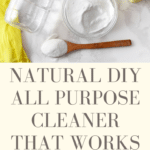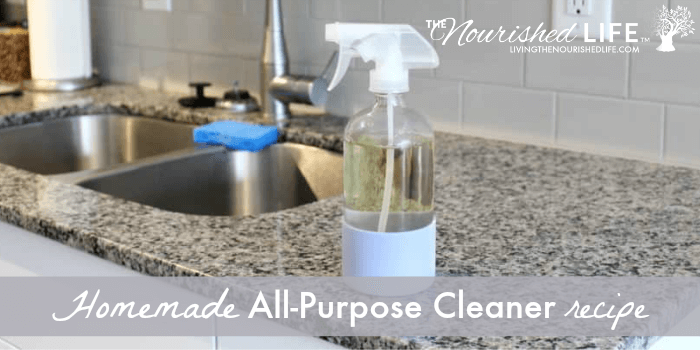Tired of cleaning products with questionable ingredients? Ditch your irritating commercial cleansers and save money with this homemade all-purpose cleaner recipe! Not only does this natural all-purpose cleaner kick some serious butt, but it cleans even better the DIY all-purpose cleaners that you’re used to. All without using any Castile soap. Keep reading to find out more!
Why I Use a DIY All-Purpose Cleaner
Cleaning is on my top ten list of things I dislike. However, as I’m sure you know, cleaning is a necessary evil. Messes obviously aren’t going to clean up after themselves.
The all-purpose cleaners that I used when my son was in grade school would often irritate my allergies. They would make my eyes water and I would sneeze a lot. There weren’t nearly as many commercial cleaning products back then as there are today. And many of the household cleaners that I purchased were not only skin irritants, but they were also not environmentally friendly.
Twenty years ago, I had no idea that I could make my own DIY household cleaners. Now that I do, making my own homemade products is something that I like to experiment with. One of my favorite cleaning recipes is a natural all-purpose cleaner.
This simple DIY all-purpose cleaner is incredibly easy to make. It doesn’t irritate my allergies and it also saves me money. I love how well it works. Plus, it’s environmentally friendly!
You can make this homemade all-purpose cleaner with as few as two ingredients. There are several variations of this recipe you can try based on why you like (and what you need to clean).
I do include vinegar in this DIY, because vinegar is a wonderful degreaser. It’s also very effective at breaking down mold and bacteria. However, if your spouse abhors the smell of vinegar, you can simply omit it from this recipe, replace it with water, and still have a great cleaning product. While the vinegar does add a boost of cleaning power for greasy kitchen messes, it may not be necessary for other rooms in your home.
You can also add either lime, lemon, grapefruit, or orange essential oil, which will not only add a fresh scent to your DIY all-purpose cleaner, but it will also perform the same task as the vinegar and help degrease your dirty surfaces. However, just like the vinegar, the essential oils can also be omitted.
Ready to learn more about essential oils? Start my FREE SUPER SIMPLE 9-STEP EMAIL COURSE to start learning – without all the stress! I focus on the absolute essentials (pun totally intended, haha) and keep everything simple. That way you can learn what you need without information overload! Start my free course now.
Why I Don’t Use Castile Soap in my DIY All-Purpose Cleaner
I do not use liquid Castile soap for this my cleaner. There are two reasons for this:
- One, I found an alternate product that works even better.
- Two, I discovered that castile soap and vinegar… don’t work well together.
Vinegar is an acid.
A natural by-product of plant fermentation, vinegar contains acetic acid and is acidic by nature. Due to this, vinegar performs well when it comes to cleaning mineral-based deposits, mold, grease, and bacteria. It’s also somewhat antiseptic and therefore inhibits the growth of some bacteria.
Castile soap, on the other hand, is a base.
Chemically speaking, an acid and a base, when combined, will cancel one another out. Therefore, as this happens, the vinegar slowly starts to “unsaponify” the Castile soap base. As saponification is the chemical process in which soap is made in the first place, this means that your soap, well, will no longer be soap.
Instead, Castile soap, when used in an all-purpose cleaner with vinegar, eventually reverts back to the oil(s) it started out as. At this point your all-purpose cleaner is not such a great cleaner anymore. Instead, it’s a mess of white chunks and oil.
(Don’t believe me? Try mixing Dr. Bronner’s liquid Castile soap directly with vinegar and see what happens!)
There are two solutions to this dilemma.
First, you can make a homemade all-purpose cleaner that uses Castile soap but not vinegar. In this case, you would use the Castile soap based all-purpose cleaner to clean your surfaces. You would then follow with the vinegar as a rinse. Or, you can keep the vinegar and simply omit the Castile soap entirely. I chose the latter.
The Secret Cleaning Ingredient That Works Better Than Castile Soap
Not long ago, I discovered an eco-friendly cleaning ingredient that works ten times better than Castile soap. This biodegradable cleaner is made by Dr. Bronner’s – the same brand that makes the famous liquid Castile soap. It’s called Sal Suds.
Dr. Bronner’s Sal Suds is a concentrated, hard surface all-purpose cleaner. It’s ideal for tackling most of your household cleaning chores and works great! I use Sal Suds to clean everything from my dishes and laundry to my countertops and floors.
Formulated using only plant-based surfactants and real essential oils, Sal Suds is completely free of synthetic dyes, fragrances and preservatives.
Because Dr. Bronner’s Sal Suds is a surfactant based cleaner and not a true soap like their Castile soap, it actually cleans better. When both Sal Suds and vinegar come together in a homemade all-purpose cleaner, what you end up with is a powerhouse cleaning solution.
Ready to make your own DIY all-purpose cleaner? Great! Let’s get started.
Homemade All-Purpose Cleaner Recipe
Ingredients:
1 1/2 cups distilled water
1/2 cup white cleaning vinegar
1 teaspoon Dr. Bronner’s Sal Suds
1-2 mL (or 20-40 drops to suit) citrus based essential oil (either lime, lemon, grapefruit, or orange essential oil)
Directions:
Combine the water, white vinegar and essential oils in a clean, empty 16 oz. spray bottle (these glass spray bottles work great). Follow with the Sal Suds, then screw on the spray top. Shake the bottle gently to mix the ingredients. Then use as desired to clean the hard, non-porous surfaces in your home. Enjoy!
More Natural Cleaning Recipes:
- How to Clean Makeup Brushes with ONE Non-Toxic Ingredient
- DIY Granite Counter Cleaner Recipe
- Lemon Citrus Vinegar Cleaner Recipe
- Natural Oven Cleaner Recipe
- 31 Natural DIY Cleaning Recipes
- What does it mean to be a crunchy

Rebecca Dawn Dillon is a soapmaker, DIY-er and blogger whose life is controlled daily by a dachshund. Find more of her homemade skin care and soap recipes at her blog, Soap Deli News. You can subscribe to Soap Deli News blog here for updates on future DIY projects and skin care recipes.


